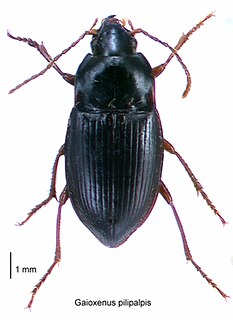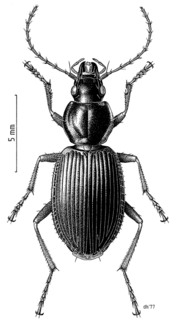
Mecodema is a genus of large flightless ground beetle (Carabidae) endemic to New Zealand. The genus is very diverse compared to the other three genera in the subtribe Nothobroscina. Mecodema is the only nothobroscine that is geographically widespread across both the North and South Islands, as well as numerous offshore islands.

Bembidion is the largest genus of beetles in the family Carabidae by number of species. All species are small and move very fast. Most of them live close to water. The genus has a biantitropical distribution, meaning they are found in both the Northern and Southern Hemispheres, but not in the tropics. In warmer regions it is substituted by closely related Tachys and other genera.
Synuchus is a genus of ground beetle native to the Palearctic and the Near East. It contains the following species:
Broscodera is a genus of beetles in the family Carabidae, containing the following species:

Diglymma is a genus of beetles in the family Carabidae, containing the following species:
Allocinopus is a genus of beetles in the family Carabidae, containing the following species:

Gaioxenus is a genus of beetles in the family Carabidae. Gaioxenus pilipalpis is the only species in the genus. This genus and species was first described by Thomas Broun in 1910. Broun based the descriptions on specimens he collected in Raurimu in the Manawatu-Wanganui region of New Zealand. Gaioxenus pilipalpis is endemic to New Zealand.
Agonum darlingtoni is a species of black coloured ground beetle from Platyninae subfamily, that can be found in the United States and Canada.
Agonum trigeminum is a species of beetle in the family Carabidae that is endemic to the United States.

Ctenognathus is a genus of beetles in the family Carabidae. This genus is endemic to New Zealand. It was first described by Léon Fairmaire in 1843.
Cerabilia is a genus of beetles in the family Carabidae, containing the following species:

Holcaspis is a genus of beetles in the family Carabidae, endemic to New Zealand.
Megadromus is a genus of beetles in the family Carabidae, containing the following species:
Neoferonia is a genus of beetles in the family Carabidae, containing the following species:
Pseudamara arenaria is a species of beetle in the family Carabidae, the only species in the genus Pseudamara.

Trechinae is a subfamily in the ground beetle family, Carabidae.
Cillenus is a genus of beetles in the family Carabidae, containing the following species:
Oopterus is a genus of beetles in the family Carabidae, containing the following species:
Zolus is a genus of beetles in the family Carabidae, containing the following species:
Carl Hildebrand Lindroth was a Swedish entomologist and a professor at Lund University. He was a specialist in carabidology, with a special interest in biogeography. He was a strong proponent of the glacial refugium hypothesis and made use of the framework to explain the distribution patterns of Scandinavian beetles.







